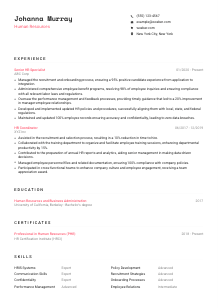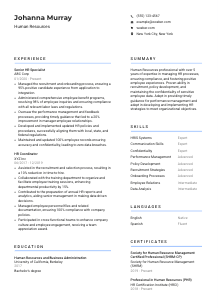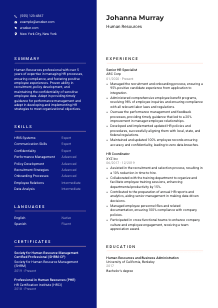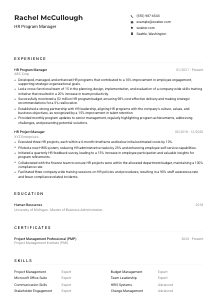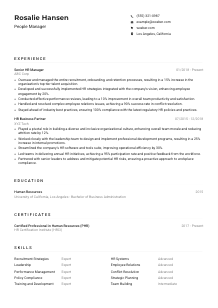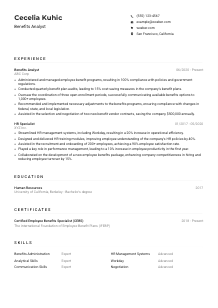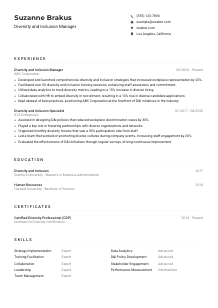Human Resources CV Example
Linking people to opportunities, but your CV feels like a cross-functional puzzle? Explore this Human Resources CV example, structured with Wozber free CV builder. See how you can effortlessly present your HR prowess to fit the hiring blueprint, and advance your career in harmony with people's potential!
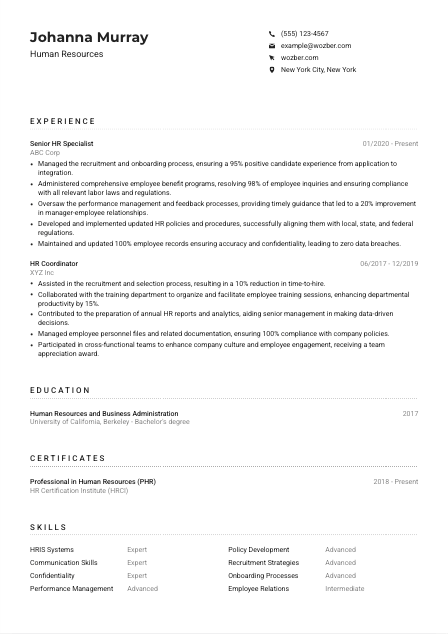
How to write a Human Resources CV?
Stepping into the world of Human Resources (HR) is like embracing the role of a bridge between the organisation's aspirations and its greatest asset: its people. In crafting your HR CV, the goal is to not just encapsulate your expertise but to tailor it intricately to the heartbeat of the role you're eyeing. Leveraging the prowess of Wozber's free CV builder, this guide is more than a nudge towards creating an ATS-compliant CV—it's a masterclass in curating a narrative that positions you as the dream candidate for your desired HR position.
Embark on this journey to align your professional saga with the demands of the HR world.
Personal Details
First impressions matter, particularly when they're on paper. The Personal Details section of your CV serves as the handshake before you've even entered the room. Tailoring this section for an HR role means more than just getting the basics right; it's about starting a conversation.
1. Name and Title
Brand yourself right from the start. Ensure your name is prominent, and don't shy from aligning it with the job title - 'Human Resources'. It not only catches the eye but also sets the professional tone immediately.
2. Job-Specific Contact Info
Your contact details must scream professionalism and accessibility. Opt for an email address that leverages your name, ensuring it sticks in the recall loop of the hiring manager.
3. Matching Location Needs
Reflect on the requirement: 'Must be located in New York City, New York'. Emphasize your local presence boldly. After all, in HR, understanding local culture and labor laws is invaluable.
4. Professional Networking
In the world of HR, your network speaks volumes. Including a LinkedIn profile that mirrors your CV's content and vitality might just tip the scales in your favor.
5. Privacy and Precision
While personal flair is vital, steer clear of including overly personal details that are irrelevant to your professional narrative. Privacy is paramount, and precision is your best friend.
Takeaway
Consider the Personal Details section as your first impression toolkit. It's concise, yet complete, and perfectly aligned with the HR job landscape. Every detail is an opportunity to preemptively answer a question the hiring manager might not realize they had. Your journey to claiming your space in the HR world starts here.





Experience
Your experience section is not just a list; it's your professional saga. Here's where you convince the hiring manager that your past victories are just a prologue to the success you'll bring to their organisation.
- Managed the recruitment and onboarding process, ensuring a 95% positive candidate experience from application to integration.
- Administered comprehensive employee benefit programs, resolving 98% of employee inquiries and ensuring compliance with all relevant labor laws and regulations.
- Oversaw the performance management and feedback processes, providing timely guidance that led to a 20% improvement in manager‑employee relationships.
- Developed and implemented updated HR policies and procedures, successfully aligning them with local, state, and federal regulations.
- Maintained and updated 100% employee records ensuring accuracy and confidentiality, leading to zero data breaches.
- Assisted in the recruitment and selection process, resulting in a 10% reduction in time‑to‑hire.
- Collaborated with the training department to organize and facilitate employee training sessions, enhancing departmental productivity by 15%.
- Contributed to the preparation of annual HR reports and analytics, aiding senior management in making data‑driven decisions.
- Managed employee personnel files and related documentation, ensuring 100% compliance with company policies.
- Participated in cross‑functional teams to enhance company culture and employee engagement, receiving a team appreciation award.
1. Decoding the Job Description
Begin with a laser focus on the job description. 'Manage the recruitment and onboarding process,' for instance, is not just a duty—it's your cue to spotlight how you've excelled in this area before.
2. Formatting Your Contributions
Chronologically list your roles, highlighting your progression and accentuating the breadth of your HR expertise. Each position should underscore your ability to navigate and enhance the HR landscape.
3. Targeted Achievements
"Managed the recruitment and onboarding process, ensuring a 95% positive candidate experience" – This is how you turn a job duty into a compelling narrative of achievement.
4. Quantify Your Impact
Numbers tell a compelling story. They provide a tangible measure of your contributions and achievements, making your capabilities clear and convincing.
5. Relevance is Key
Every point you include should be a strategic choice, aimed to resonate with the specifics of the HR role you're targeting. Keep the details richly pertinent and crisply compelling.
Takeaway
Think of your experience section as the core of your professional narrative. It's robust, reflective of your capabilities, and resonant with the role at hand. You've done more than tasks; you've made a difference. Let that shine through.
Education
In HR, your academic journey forms the foundation of your expertise. Crafting an education section that doesn't just meet but highlights your alignment with the job's educational prerequisites can set you apart.
1. Meeting the Educational Bar
Identify the exact educational requirement from the job posting, such as a 'Bachelor's degree in Human Resources or related field' and ensure it's front and center in your CV.
2. Clear Structure
Present your educational background in a way that is immediate and clear, with your most recent and relevant achievements taking the spotlight.
3. Degree Details Matter
The specificity of your degree title can significantly impact your CV's alignment with the job requirements. Ensure it reflects the required educational background precisely.
4. Relevant Courses & Achievements
Particularly if you're early in your career, spotlighting relevant coursework or academic achievements can provide additional evidence of your qualifications and potential.
5. Highlighting Additional Credentials
Though not always necessary, mentioning honors or extracurricular activities that build your profile as a well-rounded HR professional can add depth to your narrative.
Takeaway
Your education section is more than a checklist; it's a testament to your preparedness for the HR role you're aspiring towards. It reassures hiring managers of your foundational knowledge and your commitment to the field.
Certificates
In the dynamic field of HR, certifications can significantly bolster your qualifications. They reflect a dedication to professional development and a readiness to meet the industry's evolving standards.
1. Match with Job Requirements
Start by aligning your certifications with the job requirements. For example, the 'PHR or SHRM-CP certification' is not just a nice-to-have, but a direct match with what the employer seeks.
2. Highlighting the Right Certifications
Focus on certifications that augment your relevance for the HR role, emphasizing your specialization and readiness to tackle the specific challenges of the field.
3. Date and Detail
Including the date obtained or renewed for your certifications can reinforce the currentness of your expertise, showcasing an ongoing commitment to staying at the forefront of HR practices.
4. Continuous Learning
HR is a field in motion, and your certifications should reflect an ongoing journey of learning and adaptation. This forward momentum is a compelling narrative in your CV.
Takeaway
Your certifications section is a loud proclamation of your commitment to excellence in the HR field. It underscores your dedication to professional growth and highlights your alignment with the highest standards of HR practice.
Skills
The Skills section is where you get to showcase the toolkit you've developed over the years. In HR, balancing hard skills with essential interpersonal abilities is key to illustrating your comprehensive capability.
1. Distilling the Job Description
Extract both hard and soft skills directly from the job posting, ensuring your listed skills match those sought after by the employer.
2. Relevant Skills on Display
Your skills should reflect both your HR expertise and your ability to interact effectively at all organisational levels, from technical HRIS proficiency to exemplary communication acumen.
3. Structured Presentation
Organizing your skills into a readable, prioritized list signals that you not only possess these skills but are also thoughtful about their relevance and application.
Takeaway
Your skills are a direct reflection of your professional identity in the HR space. By aligning them with the specific requirements of the job, you're not just asserting your suitability; you're demonstrating a clear understanding of the role's demands and your readiness to meet them head-on.
Languages
In our interconnected world, the ability to communicate across cultures is invaluable, especially in HR. Your CV's language section can subtly underscore your capability to engage with a diverse workforce.
1. Job Language Requirements
Always start by addressing the fundamental requirement. For instance, affirming your 'English proficiency' attests to your ability to operate effectively in the role's designated lingua franca.
2. Additional Languages
Beyond the basics, additional languages can illustrate your capacity for cross-cultural communication and diversity engagement—key attributes in the dynamic field of HR.
3. Honesty in Proficiency
Clearly delineate your language capabilities using standardized levels of proficiency. This honesty ensures expectations are matched and highlights your integrity.
4. The Role's Scope
Understanding the geographical and cultural span of the role can help you prioritize which languages to feature, especially in globally oriented or diverse organisations.
5. Strategic Language Showcase
In HR, language skills can be a strategic asset. Whether it's facilitating international recruitment or enhancing employee relations, your linguistic abilities can be a potent tool in your HR arsenal.
Takeaway
In HR, every language you speak is a bridge to another facet of the human experience. Your linguistic skills not only enhance your CV but also underscore your capability to navigate the rich tapestry of today's global workforce.
Summary
Your summary is the crescendo of your professional tale on paper. It's where you distill your experience, skills, and aspirations into a narrative that speaks directly to the heart of your desired HR role.
1. The Job Essence
Capture the essence of the HR role you're targeting. Reflect on the job's core requirements and how your journey aligns with these expectations.
2. A Compelling Introduction
Kick off with a statement that encapsulates your professional identity and your dedication to the HR field, setting the tone for the narrative that unfolds.
3. Addressing the Role's Core
Highlight the skills and experiences that make you a perfect fit for the role, connecting your past accomplishments to the future contributions you're poised to make.
4. Conciseness is Key
While your professional journey is rich, your summary should be a high-impact snippet that leaves the hiring manager eager to learn more.
Takeaway
Your summary isn't just the opening paragraph—it's the pitch that gets you the interview. It's your opportunity to connect your past successes with the potential you bring to this new HR role. Craft it with care, and let it be the beacon that guides the hiring manager to you.
Launching Your Human Resources Journey
With your CV now finely tuned and ready for the HR landscape, you stand on the brink of a new professional chapter. Each section, thoughtfully crafted, works in concert to tell your story. With Wozber's free CV builder, ATS-friendly CV template, and ATS optimisation tools, including the ATS CV scanner, you're not just prepared; you're positioned to excel.
Your CV is more than a document—it's a powerful testament to your potential. Let it open doors, build bridges, and guide you to your next great opportunity in Human Resources.

- Bachelor's degree in Human Resources, Business Administration, or related field.
- A minimum of 3 years experience in HR or related roles.
- Proficient knowledge of HRIS systems and strong computer skills.
- Excellent interpersonal and communication skills, both written and verbal.
- Possession of or willingness to attain PHR or SHRM-CP certification.
- English proficiency is a fundamental requirement.
- Must be located in New York City, New York.
- Manage the recruitment and onboarding process, ensuring a positive candidate experience from application to integration.
- Administer employee benefit programs, resolving employee inquiries and ensuring compliance with relevant labor laws and regulations.
- Oversee performance management and feedback processes, providing guidance to managers and employees when necessary.
- Develop, implement, and update HR policies and procedures, ensuring alignment with local, state, and federal regulations.
- Maintain and update employee records, ensuring accuracy and confidentiality.





